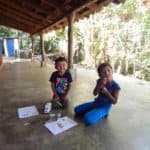Did you ever feel like you were getting lost in the shuffle? Mountain Area Health Education Center (MAHEC) must have felt that way while they were visiting Camasca on their brigade a few weeks ago. They were here for two full weeks, doing amazing work, but we must apologize for not giving them a lot of attention. I feel like I need to put some effort in my excuse for being so inconsiderate. There were only five of them: three physicians, one pharmacist, and one exceptionally talented fifteen-year old named Henry (son of Amy, one of the physicians). Five people can easily get lost, right? Besides, the whole time they were here, we had all sorts of other, bigger brigades coming and going. Our first ever surgical brigade demanded a great deal of our attention. Not to mention Brown/Wingate in Guachipilincito, VCU/FFPCS in Pinares, and a dental brigade jumping back and forth between Concepcion and Santa Lucia. February was one tremendously busy month. So, if the five people who spent time in Camasca felt as if they were neglected, you are probably right, and we’re sorry. But no one ever complained.
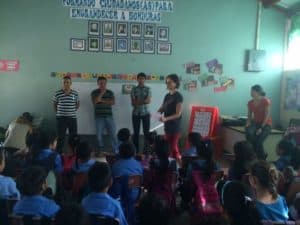
Perhaps I’m being a bit hard on myself. Truly, these five individuals were not at all demanding. If the squeaky wheel gets the grease, the quiet wheel simply turns unnoticed. The MAHEC brigade members unpretentiously arrived in town and checked into the local hotel. They got all their meals at the restaurant. Every day, they simply walked over to the health clinic or they spent some time at our bilingual school doing health screenings and playing with the kids. Henry, the fifteen year old who has fallen in love with the little town of Camasca, spent his days at the bilingual school. Henry was doing so well at the bilingual school that we were trying to sign him up as a volunteer. There’s that crazy little catch about having to finish High School.
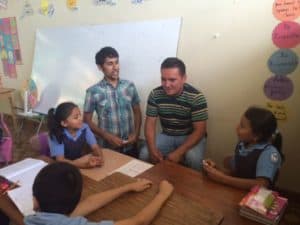
He and his mom had been here before. MAHEC is very familiar with and well known by the town of Camasca. It wasn’t any big deal for them. I guess they just kind of blended in. Their service was actually profound, but it was administered with such subtlety that it demanded no praise. I realize now why it was that the few times I had the fortune to visit with them I felt so relaxed. It was as if they were saying to me, “Look, just leave the special china in the cabinet. We’re good with the plastic ware.” There’s an integrity in such service that we would all do well to emulate.
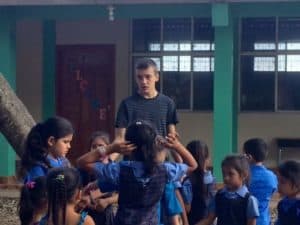
They seemed to do it all on their own with very little help from us. But lest you all think that we didn’t notice the amazing work you did, the beauty of the just relationships you committed yourselves to, and the special place you hold in the hearts of the people of Camasca and particularly the students at our bilingual school, we just want to say THANK YOU. I’m sure you’ll be back. Don’t forget to tell us when you’re coming.
Celebrations of Success
Celebrations of Success
It’s a time of celebrating around the world. The celebrations are different according to where you are. Thanksgivings are a bit difficult here as it is just another Thursday. Still, we celebrated it on the following Sunday with some friends from Colorado State University. They had the onerous task of picking out the live bird and carrying it to its sacrificial end. No presidential pardon in Honduras. Our celebrations have picked up since then. December 8 is the Roman Catholic feast of the Immaculate Conception, and as this is the feast day of the town we live in, we experienced a whole week of “fiestas patronales.” We began with a parade where our Shoulder to Shoulder car was one of six “carrozas,” or floats. We came in fourth for the competition (next year we’ll dedicate more energy to decorating), but the young woman who we sponsored as the candidate for town queen actually won the competition, the Shoulder to Shoulder Queen of Concepción. We had a “Rueda Chicago,” Ferris Wheel, in town that we rode upon. It was stacked up on tree stumps, and as it turned, it rocked a bit. The policeman standing next to it, however, told us it was perfectly safe, and why would anyone not believe a Honduran policeman. The Christmas season has officially started as of today, December 17, with the “aguinaldo,” the nine days before and including December 25. We weren’t aware of this until 4:00 AM this morning when we were joyously awakened by the sounds of sonic boom firecrackers, followed by a tone-deaf band. But there are celebrations here at this time of year that are truly joyous that simply don’t happen in the US.
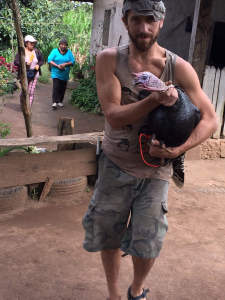
Here, as the school year here runs from February through November, we celebrate graduations. The schools pull out all the stops to enliven their graduation events with extreme fest. Our kindergarten class held its graduation on November 28. Believe me, I have never seen anything cuter than a five-year old dressed in cap and gown proudly clutching a diploma. Our celebration with excessive pomp and circumstance looked about the same as hundreds of other kindergarten graduations throughout the Frontier of Intibucá. But, the difference between our public school and all the others is the superb education and the mastery of English amongst our students. This would not be possible without the commitment and fidelity of our donors. It is with enthusiasm and gratitude that our students, and their parents, realize the dream of securing an excellent education and an opportunity for success.
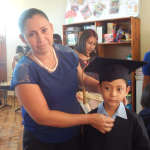
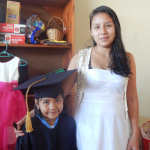
Graduations were not only celebrated at our bilingual school, but at many middle schools and high schools throughout the Frontera. Thirteen young men and women, having been supported by our scholarship program, graduated from High School this year. Education and a high school diploma are taken for granted in the United States. Here, that is not the case. Public education is said to be free, but when you add up the costs of materials, uniforms, transportation, and other incidental costs, education beyond the sixth grade is simply too great of a financial burden for most families. With the generosity of our donors, many families are given a priceless gift. Children are given an education, an opportunity to journey along a road that takes them from the despair of poverty to the hope of a successful career. The students who receive scholarships through Shoulder to Shoulder’s donor program are committed and intelligent. They have all the tools for success, but lack the resources to achieve it. But you and we have shouldered with these students and their families, and this year thirteen of them have realized a milestone that would otherwise have been impossible.
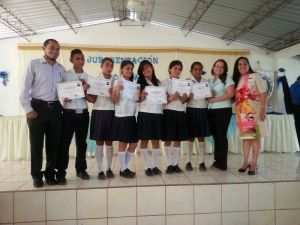
Congratulations High School Graduates – Class of 2015
José Milton Mejía Nolasco – Magdalena
Denis Antonio Ramos – Camasca
María Claudia Mejía Ramos – Camasca
Deylyn Yanory Amaya – Camasca
María Estela Vásquez – Camasca
Neiby Merari – Concepción
Dania Concepción Ramos – Concepción
María Fátima Orellana Castro – Concepción
Lesbia Suyapa Márquez – Concepción
Elmer Danilo López – Concepción
Jhonal Alejandro Torres Mejía – Concepción
Estenia Vásquez Pineda – Concepción
Enrique Mauricio Arévalo – Concepción
If you would like to read more about these graduates and the accomplishments of other students receiving scholarship support, please follow the links below.
Recording Hope
Jens sits at our dining room table, our only table, in La Esperanza, as Laura and I explain to him the particular water challenges we face here in Intibucá. Jens, a 17 year old, US born citizen of German heritage, living in Tegucigalpa, Honduras, is visiting with us over the next few days. His older brother Jan, Jan’s friend Aeden, and Mario, a friend of both families and the driver/chaperon for the trip, are all visiting us in our small and modest home. Aeden is home from college in Prague where he studies cinematography. Jan is interested in the same career, but studies at Emory University in Georgia. Shoulder to Shoulder has contracted with Aeden to produce three videos: two will be short ones on brigades and Shoulder to Shoulder in general, and the third will be a documentary on the bilingual school. Presently, we’re trying to arrange a fold out coach and three mattresses on our limited floor space so everyone can sleep. Jens continues to incredulously question us on the water, unwilling to conceive that water runs only every other day. “But, what do you do about that ‘take a shower every day’ rule?” We then introduce Jens to the concept of a bucket shower, a concept he’ll become familiar with over the next three days.
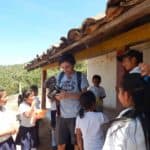
The rural, isolated, poor, frontier region of Intibucá is very unfamiliar to our four guests from Tegucigalpa. You might say that it presents as more foreign to them than it would have even to us when we first arrived. But they have all come with a spirit of openness, acceptance, and generosity. They capture on video the commitment to service in Pinares where Virginia Commonwealth University and Fairfax Family Practice Centers are holding their two week medical brigade. After a morning and afternoon of videotaping there, we drive south toward Concepcion where our guests will stay with us in our home there. It is clear that Mario doesn’t believe me when I tell him that three minutes after leaving Pinares we’ll run out of pavement. When we begin bumping up and down, navigating the trenches where rain has eroded the road, he asks how far to Concepcion. “Maybe ten miles, but it will take us about an hour.” Mario works with the Central American Bank. The Central American Bank subsidized the paving of this road. According to their records, it’s been paved all the way to Camasca. He will register an official complaint report. But our going is slow, not only because of the road, but also because every five minutes or so, Aeden and Jan yell to stop the car. They grab their equipment and jump out of the car. They take beautiful shots of the expansive terrain, the majestic mountains, and the awe it inspires. I take this road too often. I no longer recognize the breathtaking views or the bumpy drive.
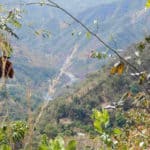
In Concepcion we all settle into our home. There is a lot more space and rooms, but we’re short a mattress. Mario disappears for a short time, and, unbeknownst to us, borrows a mattress from our neighbors. We tell the boys there is always water at night, but we often lose it for a few hours in the morning. They take no heed to our warning. In the morning, as they take their bucket showers, Laura and I are holding back our laughter as we watch them throwing cold water from our pila onto their bodies. So energetic and enthusiastic, so bright and ready to take on the world. With the medium of video, they will make art, their free expression to inspire.
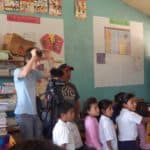
We head to Camasca and the bilingual school. Here, they are recording a view of hope. The parents send their children to our school with a great hope of something new, of achievement, of a better day. I can’t help think about those expansive, limitless views of the mountains from yesterday. Ironic, here where boundless beauty is so easily witnessed in nature, the constraints of poverty are so clear. Poverty limits experience, limits the horizon. Aeden films Juan Carlos and Keilyn, two cousins who live two-hundred meters below the town proper. They don’t have much, but they do have a climb up a great hill every morning. It’s a rugged climb and I feel some shame for my self pity that the road I travel is not paved. The path Juan Carlos and Keilyn take is one with carved footholds into a slate, rock face. They climb, we climb, we film, we record, and this is hope. It springs upon us when we reach the summit, an opening appears. Then we’re at the school.
Some of us have been given much, some of us, little. But all of us have rutted roads to travel, and all of us can gaze upon the expansive beauty of our world. Can not all of us then pattern hope? We can remember and record. We can share. It is not so important from where we start our journeys, but the integrity of the journey is the clear testament of hope.
